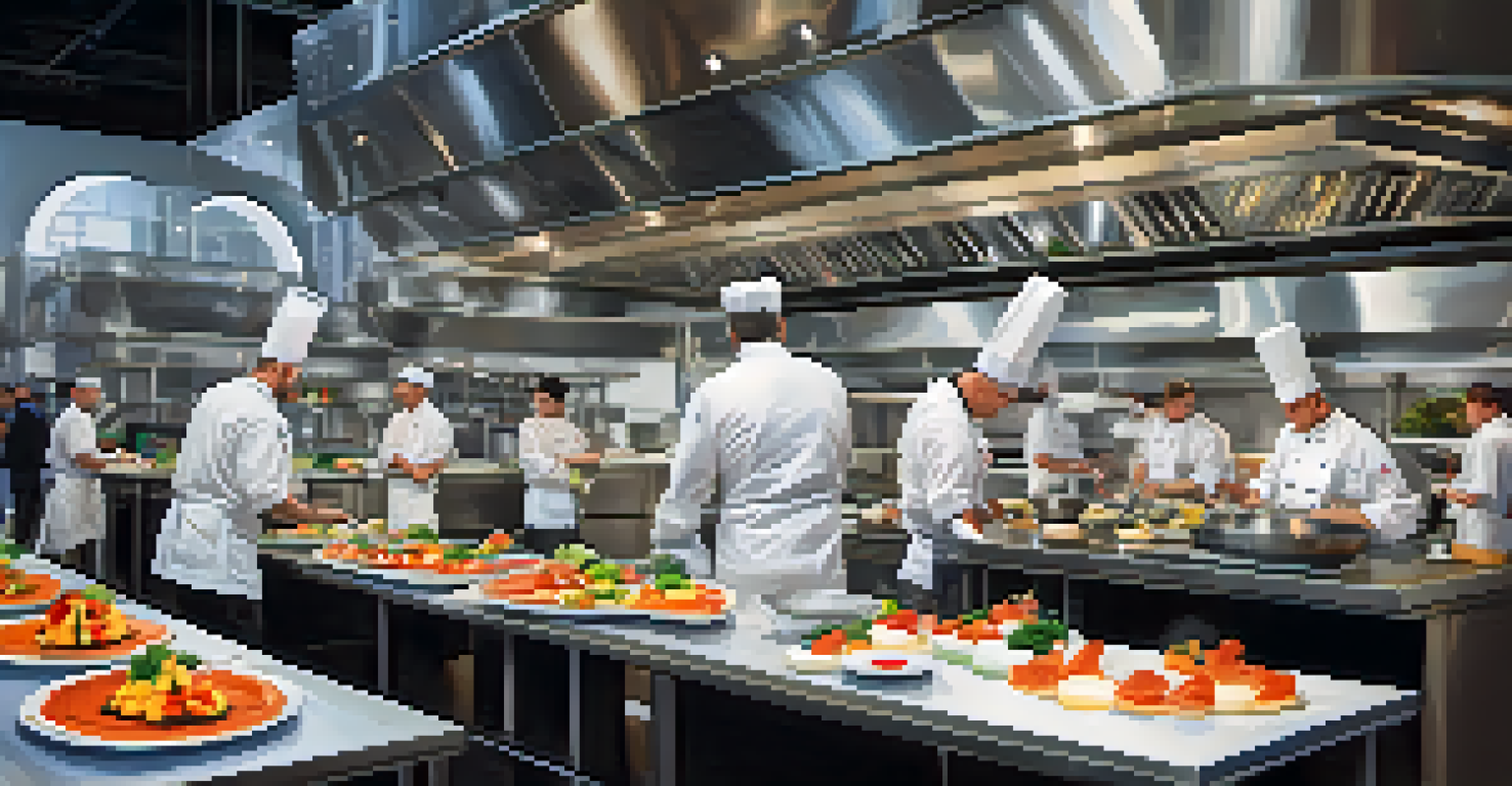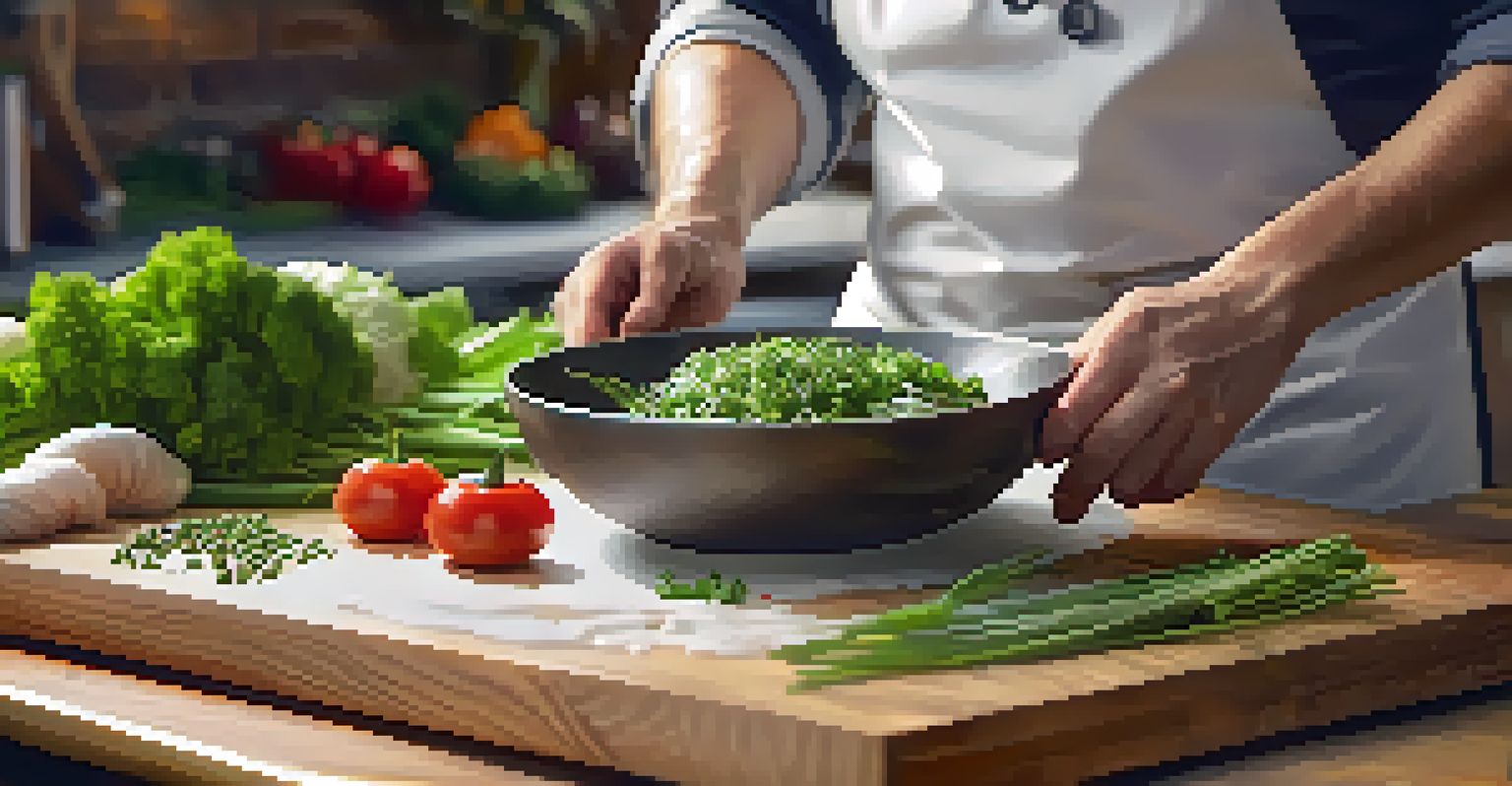Nurturing Talent: Culinary Schools in Austin and Competitions

The Culinary Landscape of Austin: A Flavorful Journey
Austin's culinary scene is a vibrant tapestry of flavors, reflecting its diverse culture and rich heritage. With an array of food trucks, upscale restaurants, and local markets, the city has become a haven for food lovers and aspiring chefs alike. The city's passion for food is not just about dining; it's about creating and sharing culinary experiences that resonate with the community.
Food is our common ground, a universal experience.
This environment has paved the way for numerous culinary schools that strive to nurture talent and ignite creativity. These institutions offer aspiring chefs a chance to immerse themselves in both the art and science of cooking. From traditional techniques to modern culinary innovations, students are equipped with the skills needed to thrive in this competitive industry.
Moreover, the connection between culinary schools and local eateries fosters a symbiotic relationship. Graduates often find opportunities for internships and jobs in renowned restaurants, allowing them to gain real-world experience. This fusion of education and practical application is what keeps Austin's culinary landscape ever-evolving and dynamic.
Top Culinary Schools in Austin: Where Passion Meets Education
Austin boasts several reputable culinary schools that cater to a variety of culinary interests and career paths. Institutions like the Austin Community College Culinary Arts program provide students with a comprehensive education, blending hands-on training with theoretical knowledge. Such programs focus on everything from basic cooking skills to advanced culinary techniques, ensuring students are well-prepared for their future careers.

Another notable institution is Le Cordon Bleu, which has a global reputation for excellence in culinary education. Though it has closed its physical location, the legacy of its training still influences many chefs in the area. Alumni often speak of the rigorous training and mentorship they received, which continues to inspire their culinary journeys.
Austin's Culinary Scene Thrives
The city's vibrant culinary landscape is shaped by diverse flavors, food trucks, and local markets.
Additionally, local chef workshops and short courses offer more casual avenues for culinary enthusiasts to explore their passion. These programs often invite guest chefs to share their expertise, providing a unique opportunity for students to learn directly from industry professionals. This accessibility helps create a culture of continuous learning and improvement in Austin's culinary community.
The Role of Competitions in Culinary Development
Culinary competitions play a crucial role in the development of aspiring chefs, providing them with a platform to showcase their skills and creativity. Events like the annual Austin Food & Wine Festival feature competitions where both amateur and professional chefs can demonstrate their culinary prowess. These competitions not only highlight individual talent but also celebrate the richness of Austin's food culture.
Cooking is like love. It should be entered into with abandon or not at all.
Participating in competitions can be a transformative experience for many chefs. It pushes them to innovate and think outside the box while working under pressure. The feedback and exposure gained from these events can significantly boost a chef's confidence and open doors to new opportunities within the industry.
Moreover, these competitions foster a sense of camaraderie among participants, creating a supportive community of culinary professionals. Chefs often network, share experiences, and even collaborate on projects post-competition. This environment of encouragement and friendship is vital for nurturing talent and cultivating the next generation of culinary leaders.
Local Competitions: A Taste of Austin's Culinary Spirit
Austin hosts several local culinary competitions that highlight the creativity and skills of its chefs. Events like the 'Iron Fork' challenge put participants in the spotlight, requiring them to prepare a dish using a secret ingredient in a limited timeframe. This not only tests their culinary skills but also their ability to think quickly and adapt under pressure.
These local contests often draw large crowds, creating a festive atmosphere that celebrates food and community. Attendees get a chance to taste the dishes, engage with chefs, and learn more about the culinary arts. It’s a fantastic way for the community to connect with local talent and appreciate the hard work behind the meals they enjoy.
Culinary Schools Nurture Talent
Austin's culinary schools foster creativity and skill development, preparing students for successful careers.
Additionally, local competitions often serve as a springboard for chefs to gain recognition and advance their careers. Winners may receive scholarships, job offers, or even opportunities to present their dishes at larger events. Such recognition can be a game-changer for aspiring chefs looking to make their mark in the culinary world.
The Impact of Culinary Schools on Local Communities
Culinary schools have a profound impact on local communities, not just by producing skilled chefs but also by fostering a culture of food appreciation. Students from these institutions often engage in community service projects, such as cooking for shelters or participating in local food drives. This involvement helps bridge the gap between culinary education and community needs, creating a sense of responsibility among future chefs.
Furthermore, these schools often collaborate with local farms and suppliers, emphasizing the importance of using fresh, local ingredients. This relationship not only supports local agriculture but also teaches students the significance of sustainability in the culinary world. Understanding where food comes from is an essential lesson for any aspiring chef.
As students graduate and begin their careers, they often bring this sense of community-focused culinary practice with them. Many go on to open their own restaurants or food businesses that emphasize local sourcing, sustainability, and community engagement. Thus, the ripple effect of culinary education can lead to a more connected and conscious food culture in Austin.
Challenges Faced by Aspiring Chefs in Austin
While Austin's culinary scene is thriving, aspiring chefs face their own set of challenges. The competition is fierce, with many talented individuals vying for the same opportunities. This saturated market can make it difficult for newcomers to establish themselves and gain recognition in the industry.
Additionally, the financial burden of culinary education can be daunting. Tuition costs, along with the expenses of tools and supplies, can add up quickly. Many students find themselves juggling part-time jobs while attending school, which can be overwhelming but also fosters resilience and work ethic.
Competitions Boost Culinary Growth
Local culinary competitions provide aspiring chefs with valuable exposure, networking opportunities, and a platform to showcase their talents.
Lastly, the fast-paced nature of the culinary world can lead to burnout. Long hours, high-pressure environments, and the constant need for creativity can take a toll on mental and physical health. It's crucial for aspiring chefs to find a balance and prioritize self-care, ensuring they can sustain their passion for cooking in the long run.
The Future of Culinary Arts in Austin: Trends to Watch
As Austin continues to evolve as a culinary hotspot, several trends are shaping the future of culinary arts in the city. One prominent trend is the increasing focus on plant-based cooking, reflecting a broader societal shift towards health and sustainability. Culinary schools are adapting their curriculums to include more plant-based techniques, preparing students for an industry that is rapidly changing.
Another trend is the rise of technology in the culinary world. From online cooking classes to advanced kitchen gadgets, technology is transforming how chefs learn and operate. Culinary schools are integrating these tools into their programs, ensuring that students are well-versed in the latest innovations.

Finally, diversity and inclusivity are becoming central themes within Austin's culinary community. Chefs from various backgrounds are bringing their unique perspectives and flavors to the forefront, enriching the local food scene. This emphasis on diversity not only enhances the culinary landscape but also fosters a more inclusive environment for aspiring chefs to thrive.